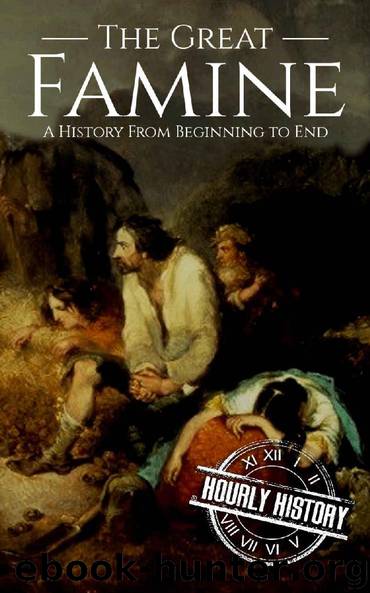The Great Famine: A History from Beginning to End (Irish History Book 2) by Hourly History

Author:Hourly History [History, Hourly]
Language: eng
Format: epub
Publisher: Hourly History
Published: 2019-06-10T05:00:00+00:00
Chapter Six
Mass Emigration
“What means the paying of the passage and emptying out upon our shores such floods of pauper emigrants—the contents of the poor house and the sweepings of the streets?—multiplying tumults and violence, filling our prisons and crowding our poor-houses.”
—Lyman Beecher
Many landowners in Ireland were close to bankruptcy. Their tenants could not afford to pay rents and plans to use farms for the more profitable grazing of cattle or sheep were impossible because of the many farm laborers’ cottages and smallholdings scattered across most farms. The solution was brutally simple—if the poor could be removed from the farms, these could be restructured in ways that were liable to produce more profit. Landowners went about ridding themselves of unwanted tenants in two ways.
The most popular and most common way was simply to evict tenants. With so little work around and poor families being forced to spend what little savings they had to buy food, many were in arrears with rents. A landlord could apply for a legal judgment against a tenant, and when this was given the male head of the family could be imprisoned and the other members of the family evicted from their home. In the period 1845 to 1849, it is estimated that up to half a million people were evicted from their homes in Ireland for rent arrears.
The second way of getting rid of unwanted tenants was to promise to pay for their emigration to North America. Poor families were tempted by stories of an easy life in the New World, and landlords promised not just to pay for these people’s passage to Canada or America but also to pay them a substantial bonus when they arrived in that country, enough to allow them to set themselves up comfortably in the new country.
The truth was very different. British laws pertaining to carriage of passengers on sailing ships were very lax. For example, even for a voyage to North America which might take anything from forty days to three months, very little food was provided for passengers—the assumption was that passengers would bring their own food. However, many of the poor Irish who agreed to emigrate in 1847 had no food to bring and their hunger continued during the voyage. Likewise, passenger accommodation was spartan, and there were few regulations relating to safety. People were packed in together in conditions that were unsanitary and unhealthy. Diseases like cholera and typhus, which had become common in Ireland during the famine, were spread on ships taking people to America.
The situation became so serious that many Canadian and American ports refused to accept ships from Ireland or made them wait for extended periods for quarantine checks. In Quebec, for example, by June of 1847, it was estimated that up to 14,000 Irish immigrants were waiting in ships moored on the Saint Lawrence River to undergo medical checks before they were allowed into the country. Being confined on ships where there were people suffering from diseases such as cholera and typhus meant that even healthy people contracted these diseases while they waited to be allowed ashore.
Download
This site does not store any files on its server. We only index and link to content provided by other sites. Please contact the content providers to delete copyright contents if any and email us, we'll remove relevant links or contents immediately.
| Africa | Americas |
| Arctic & Antarctica | Asia |
| Australia & Oceania | Europe |
| Middle East | Russia |
| United States | World |
| Ancient Civilizations | Military |
| Historical Study & Educational Resources |
Life of Elizabeth I by Alison Weir(2078)
The Invisible Wall by Harry Bernstein(1799)
Art of Betrayal by Gordon Corera(1429)
1916 in 1966 by Mary E. Daly(1281)
Thunderstruck by Erik Larson(1259)
The Decline and Fall of the British Empire, 1781-1997 by Piers Brendon(1123)
A Brief History of Britain, 1066-1485 by Nicholas Vincent(1038)
A Brief History of Britain, 1485-1660 by Ronald Hutton(1008)
Guy Burgess by Stewart Purvis(1004)
Mary, Queen of Scots by Weir Alison(990)
Henry VIII by Alison Weir(937)
The Last Lion 02 - Winston Churchill - Alone, 1932-1940 by William Manchester(927)
Fifty Years On by Malachi O'Doherty(909)
Lang Lang by Lang Lang(877)
1066 by Andrew Bridgeford(859)
Gimson's Kings and Queens by Andrew Gimson(856)
Coalition by David Laws(840)
The Last Plantagenet by Thomas B Costain(838)
London: A Biography by Peter Ackroyd(830)
